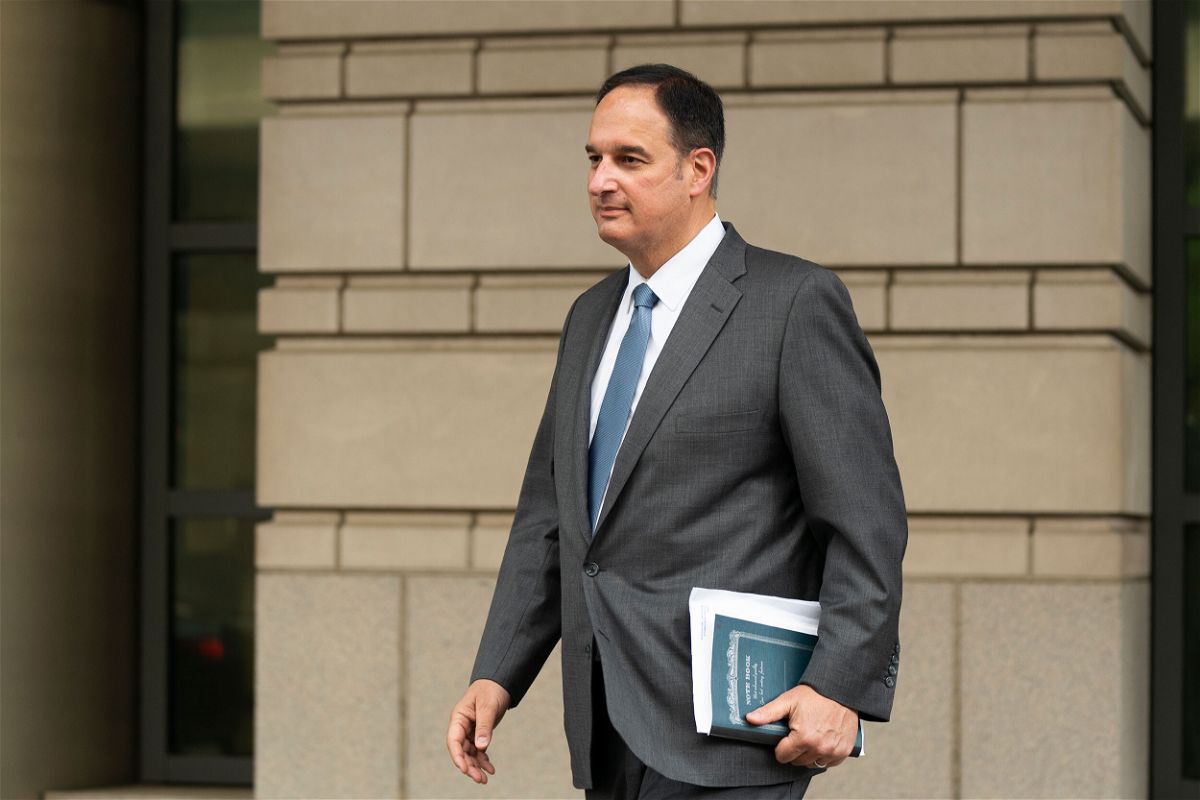Prosecutors say Clinton campaign lawyer tried ‘to manipulate the FBI’ with Trump-Russia tip as first Durham trial opens

Special counsel John Durham's prosecutors laid out their case against Hillary Clinton campaign lawyer Michael Sussmann
By Marshall Cohen, CNN
Special counsel John Durham’s prosecutors laid out their case against Hillary Clinton campaign lawyer Michael Sussmann during opening statements Tuesday, accusing him of scheming “to inject the FBI into a presidential election” by peddling an ultimately unsubstantiated tip about Donald Trump’s ties to Russia, eight weeks before Election Day.
“The defendant’s lie was all part of a bigger plan. … It was a plan to create an October surprise on the eve of the election … to use and manipulate the FBI,” prosecutor Brittain Shaw said.
She described Sussmann as a “high-powered DC lawyer” who “lied to direct the power and resources of the FBI to his own ends, and to serve the agendas of his clients,” who were the Clinton campaign and a tech executive. “This is a case about privilege,” Shaw added.
Sussmann has been charged with one count of lying to the FBI, and the case was brought as part of Durham’s investigation into potential misconduct related to the FBI’s Trump-Russia probe. The indictment accuses Sussmann of falsely telling the FBI he wasn’t representing any clients when he provided the Trump-Russia tip in September 2016. Sussmann has pleaded not guilty.
Prosecutors appealed to the jurors to set politics aside and convict Sussmann because, they say, he abused the trust of senior FBI officials to try to help Clinton win the 2016 presidential election. Jurors’ political affiliations, contributions and volunteer work for candidates, including Clinton, repeatedly came up during the jury selection process.
“Whether we hate Donald Trump or like him, we have to agree that some things have to be above politics. One of those things is our law enforcement agencies, and the other is truth,” Shaw said.
The case, playing out in DC federal court, is expected to last about two weeks. It’s the first major courtroom test of the three-year Durham investigation. For the second day, Durham was in court for the all-day proceedings, and huddled with his team in the hallways during breaks.
Defense blasts ‘nonsensical’ case
In opening statements, Sussmann’s defense attorney said the case was “an injustice” and vehemently denied that he was part of any scheme to deceive the FBI.
His lawyer, Michael Bosworth, argued that all Sussmann wanted to do was get information to the press about Trump’s ties to Russia. Once a major outlet was ready to publish the material, Sussmann wanted “to help the FBI” and warn them that a story was coming, Bosworth said.
“The meeting with the FBI is the exact opposite of what the Clinton campaign would’ve wanted,” Bosworth said, explaining that the FBI quashed the news story after learning about it from Sussmann. “The FBI meeting is something they didn’t authorize, they didn’t direct him to do, and they didn’t want him to do.”
Bosworth lambasted Durham’s central theory of the case, telling jurors it is “nonsensical” that Sussmann was trying to conceal his ties to the Clinton campaign. For one, Sussmann’s partisan ties were well-known to the FBI at the time, largely because he was the Democratic National Committee’s lawyer after they were hacked by the Russians in 2016.
“His partisan affiliations, they were out and about, loud and clear for everyone to see,” Bosworth said, as he displayed some of Sussmann’s emails to the FBI in his role as the DNC’s lawyer.
Bosworth added: “If he was trying to dupe the FBI, why give them the data that they could evaluate for themselves? … He had a genuine interest in national security and doing the right thing.”
Glimpse into Trump-Alfa probe
The first day of witness testimony shed considerable new light on the FBI’s efforts to run down Sussmann’s tip — that the Trump Organization had a secret server that was potentially communicating with Russia-based Alfa Bank during 2016, perhaps to collude on the election.
It’s been public for years that the FBI determined there weren’t improper cyber links. But the US government hasn’t previously told the public what the FBI did to reach that conclusion.
FBI special agent Scott Hellman, a cyber division supervisor who examined Sussmann’s data and a “white paper” with assertions about the data, testified that the people behind the material performed a “questionable” analysis and “jumped to some conclusions that were not supported.”
“I thought perhaps the person who had drafted this document was suffering from some mental disability,” Hellmann said, after he was asked to explain what he meant in an internal FBI chat message that he sent after reviewing the white paper, where he said: “it feels a little 5150-ish.”
Durham’s team also revealed the FBI’s final conclusion on what the data showed. This has remained one of the unsettled mysteries from the 2016 election, especially after special counsel Robert Mueller released his sweeping report but never mentioned the Trump-Alfa server claims.
The FBI investigation found “the server was merely a spam email server used for sending out marketing emails,” Shaw told the jury during her opening statements. “The server did not reflect a crime, nor was it a threat to national security.”
The spam server theory was previously put forward by Alfa Bank.
A bipartisan Senate report said in 2020 that it accepted the FBI’s findings about the “unusual activity,” but noted that the two companies gave contradictory explanations for what happened.
Over the years, some cybersecurity experts have raised questions about the thoroughness of the FBI’s inquiry. Hellmann said he made his findings within one day, before passing the case onto other investigators in the FBI’s counterintelligence division. He said he didn’t attempt to interview the researchers who compiled the data, didn’t seek search warrants or subpoenas.
This story has been updated with further developments on Tuesday.
The-CNN-Wire
™ & © 2022 Cable News Network, Inc., a WarnerMedia Company. All rights reserved.
